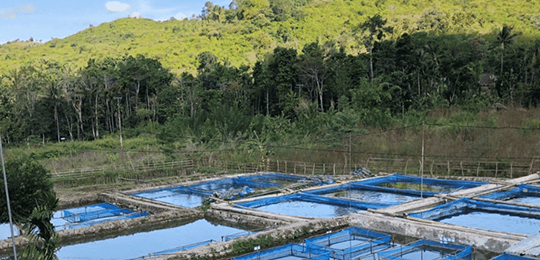September 2019
Can Aquaculture Help Alleviate Poverty and Malnutrition?
 The government of Timor-Leste aims to increase aquaculture production to 12,000 tonnes by 2030 in order to help alleviate malnutrition – Image: Tilapia Hatchery, Timor-Leste by WorldFish
The government of Timor-Leste aims to increase aquaculture production to 12,000 tonnes by 2030 in order to help alleviate malnutrition – Image: Tilapia Hatchery, Timor-Leste by WorldFish
Over 100 aquaculture stakeholders met last month at the second National Aquaculture Forum in Dili, Timor-Leste to address one question: Can Aquaculture Help Alleviate Poverty and Malnutrition in Timor-Leste?
The discussion which supports the Timor-Leste National Aquaculture Development Strategy (2012-2030) focused on the development and growth of the aquaculture sector in strengthening the country’s food and nutrition security.
With aims to increase fish production from current levels of 150-200 tonnes a year to 12 000 tonnes per year by 2030, Dr. Jharendu Pant of WorldFish says they aim to reduce malnutrition by increasing fish consumption from 6.1kg to 15kg person/year over time.
‘About 100 tonnes of Nile tilapia (mainly the GIFT strain) are currently produced. The next most popular species is common carp, while a small number of farmers are producing milkfish, shrimp and catfish. In the future tilapia is likely to contribute over two thirds of total aquaculture production.’
In his report for FishSite, Rob Fletcher said the forum which was held at the Timor Plaza Hotel provided a platform for stakeholders to share research and development experiences and identify opportunities for fostering partnerships in aquaculture development in Timor-Leste.
Joáquim José Gusmão dos Reis Martins, Timor-Leste’s Minister of Agriculture and Fisheries, in his opening remarks said developing aquaculture is a key priority for the government of Timor-Leste, ‘Increasing the production of fish will ensure that rural households have greater access to an affordable, nutritious source of animal protein and have an alternative livelihood option. The government is committed to fostering strong partnerships among aquaculture stakeholders to realise its development targets.’
Since 2014, the Partnership for Aquaculture Development in Timor-Leste project has supported the Timor-Leste Government to develop aquaculture with a holistic approach. Philip Hewitt, New Zealand’s Ambassador to Timor-Leste said the development of seed and feed systems with suitable farmer training method and building the capacity of MAF and other partners made this possible. He added these efforts laid the foundation for the scaling out of the approach and public and private sector partners have key complementary roles in achieving this.
The director general of WorldFish, Dr. Gareth Johnstone expressed similar views and said that Fish is essential to Timor-Leste’s development strategy and that the country had made huge strides in boosting its aquaculture sector in recent years.
‘The National Aquaculture Forum is a great opportunity to share the successes and lessons learned so far, and strengthen the partnerships necessary to ensure sustainable aquaculture fulfils its potential to improve food and nutrition across the country.’
The forum was organised by the Partnership for Aquaculture Development in Timor-Leste (PADTL) project, funded by New Zealand Aid and managed by the CGIAR Research Program on Fish Agri-Food Systems (FISH) led by WorldFish in partnership with the Timor-Leste Government.
The forum brought together over 100 participants from diverse backgrounds, including government, trade and investment, commercial banks, academics, non-governmental organizations, the private sector, development agencies, farmers and fishers.
The forum will be held annually from 2020 and follows on from the country’s inaugural aquaculture event in 2017.
